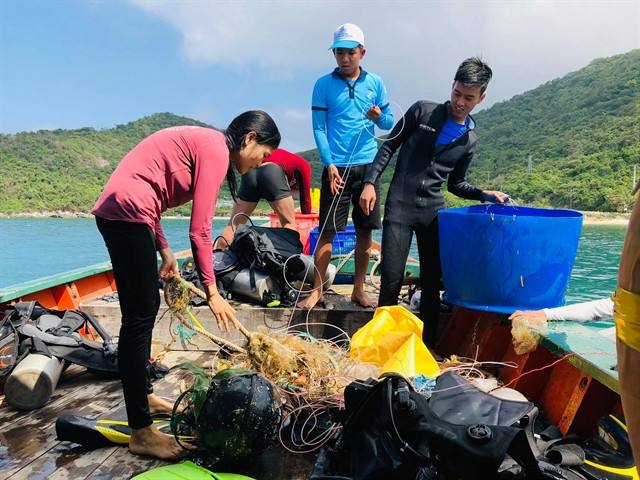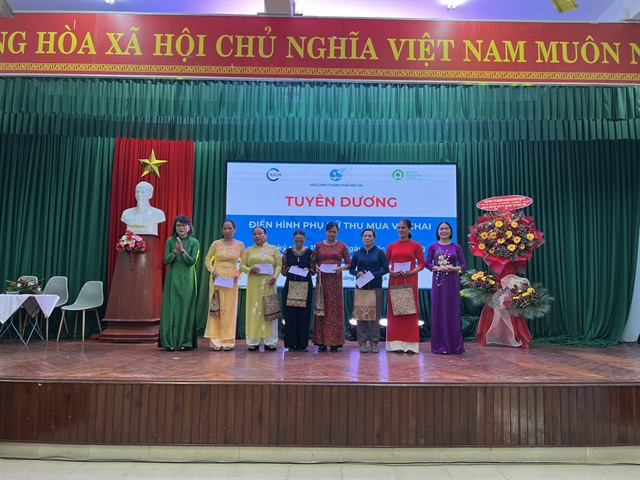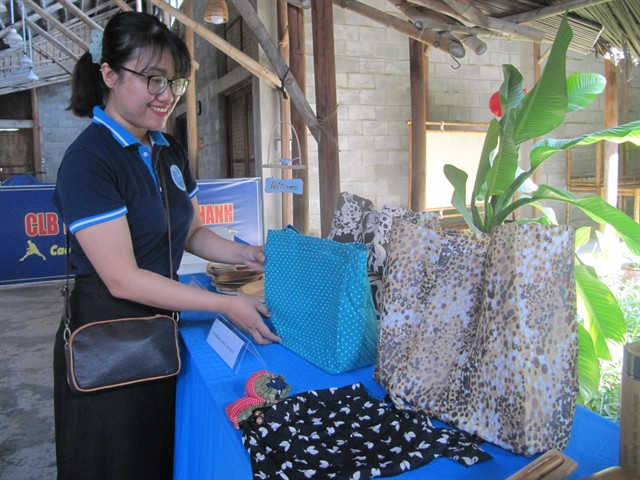 |
| Volunteer waste collectors grab plastic fishing nets near the Chàm Islands, off the coast of Hội An. The ancient town has been building a 'zero' waste and free-plastic area in Việt Nam. Photo courtesy of Chàm Islands MPA |
A workshop for informal waste workers (IWWs) to discuss Việt Nam’s preparations for the ongoing Global Plastic Treaty’s negotiation was held in the ancient town in collaboration with UNDP Việt Nam, the Gender and Social Inclusion Task Force of the National Plastic Action Partnership (NPAP), and IUCN Việt Nam (through the IUCN-PRO Việt Nam strategic partnership).
The event, which involved the participation of UNDP, IUCN, the Canadian Embassy in Việt Nam and NGOs, aimed to recognise the role of informal waste workers and integrate IWWs into Extended Producer Responsibility (EPR) implementation on the occasion of International Women’s Day.
 |
| Informal waste workers are honoured at an event by IUCN and Hội An city. The UNESCO-recognised world heritage has 70 informal waste collectors who have helped clean the city. Photo courtesy of Thùy Anh |
In Việt Nam, the informal sector, of which women account for up to 90 per cent, helps collect over 30 per cent of recyclable plastic, thereby reducing the waste collection and treatment costs paid by the Government.
The EPR scheme is expected to bring about significant changes in the waste management system that will impact IWWs in the collection and recycling of waste.
The EPR will fundamentally affect the waste collection, sorting and recycling system in Việt Nam, which is currently undertaken by the informal sector.
According to The Circulate Initiative (2023), about 60 per cent of plastic waste is collected and recycled by 20 million informal waste workers globally, who are among the most vulnerable and marginalised groups in society.
To shape a sustainable plastic circularity and implement national plans, it is necessary to ensure that IWWs have opportunities to improve their livelihoods and support them to transit into the formal waste management system.
Ramla Khalidi, resident representative of UNDP Việt Nam, recommended: “The informal sector must be part of any solution and can help producers achieve recycling targets under the EPR system. Beyond informal waste workers, the sector also includes others in the value chain such as scrap dealers, junk shops, aggregators, even semi-informal cooperatives in some provinces. Therefore, their voices should be heard and recognised.”
 |
| A woman shows bags made from recycled material in Hội An city. Most local people and tourists visiting the city are aware of waste classification and keeping the destination clean. VNS Photo Công Thành |
"EPR is not only about producers’ responsibility towards recycling rates, but also about responsibility for people throughout the waste value chain, and especially informal waste workers, whose livelihoods depend on waste collection,” Khalidi said.
"Plastic pollution is a global problem that requires urgent attention. We are fully engaged to end plastic waste and pollution as we move towards a circular plastics economy. EPR programmes are an effective policy tool as part of a broader waste management system, which needs to take into consideration local and regional circumstances and the important role of informal waste workers,” Khadija Jarik, First Secretary at the Embassy of Canada, shared.
IUCN Country Representative Jake Brunner emphasises that waste pickers, almost entirely women, do a vital job collecting, transferring, and pre-treating waste.
“They therefore play a key role in the circular economy. The challenge is to improve their working conditions and connect them to the formal solid waste management system. This will require effective waste separation at source, much greater government investment in waste collection and processing, and enforcement of anti-littering rules,” Brunner said.
Before the meeting, the participants and the Task Force also visited pilot models ‘Green House’ and ‘Happy Shop’, which were designed and developed by "unsung heroes" in Hội An City.
Understanding local context and boosting innovative ideas are approaches for all members of the Task Force to finalise its work plan for 2024 and take actions in different areas of Việt Nam. The Việt Nam National Plastic Action Partnership (NPAP) is a nationally led multi-stakeholder platform that enables collaboration between the Government and other vital partners to turn plastic waste and pollution commitments into actions.
From 2022, Việt Nam NPAP Secretariat is officially hosted by UNDP Việt Nam, which operates and leads the support of NPAP’s activities.
The NPAP Gender and Inclusivity Task Force, launched on December 15, 2023, comprises 16 organisations from policymakers, waste collectors and recyclers, development partners, impact investors, innovators and gender experts with an aim of mitigating plastic waste and plastic pollution by promoting gender and inclusivity interventions that take into account the roles of the informal sector and different social groups in supporting plastic waste collection, segregation and recycling.
The Task Force is chaired by the Canadian Embassy in Việt Nam, and co-chaired by the Institute of Strategy and Policy in Natural Resources and Environment.
Hội An ancient town in central Quảng Nam Province has been promoting ‘zero' waste and ‘zero’ plastic since it successfully launched the ‘3Rs’ (reduce, reuse and recycle) as well as a plastic waste reduction campaign since 2011.
Refillable Hội An, the first refillable concept store in the ancient town, helps local residents refill more than 10,000 containers instead of sending them off to landfill.
The Quảng Nam Tourism Association said about 100 hotels, homestays, villas, restaurants, and travel agencies in Hội An have begun building the ‘Zero plastic waste tourism’ brand and 100 ‘green’ businesses since 2023.
Hội An and the Chàm Islands have been receiving support and cooperation from the IUCN and the World Wildlife Fund (WWF) in helping the two communes become the first successful ‘zero waste’ locations in Việt Nam.
IUCN, in co-operation with the local Women’s Union and organisations for the support and protection of people with disabilities and children, honoured the best 20 out of 70 informal waste workers in Hội An for their contribution to the environmental protection and ‘waste free’ communities. VNS